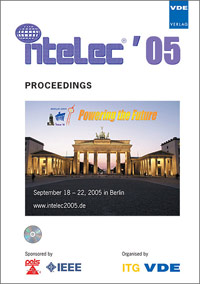Cost/Benefit Analysis of High Performance Controllers in Low-End Telecommunication Power System Applications
Konferenz: Intelec '05 - Telecommunications Conference - 27th International Telecommunication Energy Conference
18.09.2005 - 22.09.2005 in Berlin, Germany
Tagungsband: Intelec '05 - Telecommunications Conference
Seiten: 4Sprache: EnglischTyp: PDF
Persönliche VDE-Mitglieder erhalten auf diesen Artikel 10% Rabatt
Autoren:
Schmerbeck, Werner (Siemens AG, Munich, Germany)
Inhalt:
Current telecommunication infrastructure needs a large number of small and decentralised installations like e.g. remote digital line units (RDLU) in wire-line networks or base transceiver stations (BTS) in mobile networks. Selected in respect to minimum infrastructural costs, especially power system components often lack supervision functionality that allows optimizing long-term reliability or serviceability. Another limitation is given by reduced to minimum alarm forwarding. With use of high-end control unit, purpose build to telecommunication infrastructure needs, it is possible to reduce both, operational and service costs. Performances of current embedded controllers even allow custom designed functionality to appropriate costs. One topic of this paper is to show how high-end controllers can be adapted to individual system designs that not only allow optimizing power system needs but also integration of site-specific infrastructural installations supervision. Use of memory programmable controllers that either operate stand-alone as master or in parallel, than configured to work as slave or I/O-extension, offer both flexibility to serve all systems from low- to high-end with the same hardware and to realize optimized relation to cost.


